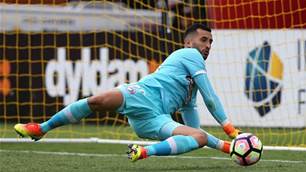For so long it was the rest of the hockey world doing all the laughing as the Kookaburras flew in and left Olympic Games gold medal-less.
For so long it was the rest of the hockey world doing all the laughing as the Kookaburras flew in and left Olympic Games gold medal-less.
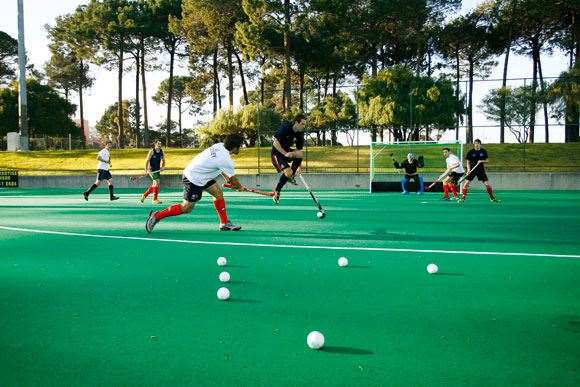 Three-on-three or six-on-six games at training are the ultimate conditioning tool
Three-on-three or six-on-six games at training are the ultimate conditioning toolImages: Theron Kirkman
Their breakthrough win at Athens 2004 not only shook a very irritating monkey off the Aussies’ backs, it blasted them back to the top of the men’s hockey tree.Since that epic 2-1 extra-time victory over the Dutch in the gold medal showdown, our boys have finished champions in the ’05 Champions Trophy, runners-up at the ‘06 World Cup, 2006 Commonwealth Games gold medal winner and second and title holders in the ‘07 and ’08 Champions Trophies respectively. A bronze behind gold-medallists Germany and second-placed Spain at Beijing last year wasn’t to be sneezed at, either. Part of the problem for our international rivals has been Liam De Young, a defender/midfielder who’s been a key part of the Kookaburras squad since being honoured with their Best Young Player gong in 2001. “DY”, a proud Queenslander, lets nothing through, is extremely quick and has over 200 caps of international experience behind him.The Commercial Law and Sports Management degree student was accommodating enough to take us through a typical week in camp with the Kookaburras at their base at the Perth Hockey Centre. Watch out for him against the Poms, Germans, Koreans, Dutch and Spanish at the ’09 edition of the Champions Trophy in Melbourne from November 28 to December 6.
AROUND THE WORLD
“The Kookaburras squad has to peak two or three times each year. By peak, I mean finalising preparations for our biggest tournaments. Internationally we play all year round, so there’s not so much a ‘season’, if you like. This year we played some home games in January against Holland, followed in February with some against Belgium. In June we headed over for the Hamburg Masters in Germany. In August we had our World Cup qualifying event – that was well and truly our major focus for the year.
“The tours to Europe and the games we played in January and February were all important matches, but I guess they were all used to select a squad and really put things in place for a big performance in August. We managed to knock New Zealand off over there, so we’ve qualified for the World Cup, meaning we don’t have to play any repechage games.
“Training wise, our work depends on what phase we’re in. At the moment our phase is a bit of a conditioning one – less hockey focused and more of a focus on conditioning. Once the whole squad assembles in Perth for our final preparation for this year’s Champions Trophy, we’ll come into more hockey-specific, gameplay-type training.”
THRILLS AND SKILLS
“A standard week would involve three skills/field sessions. We’ll incorporate team strategies; set plays, attacking and defensive plans, a lot of general gameplay. “In hockey you have your pretty standard set plays; your penalty corner, attacking penalty corners in defence etc. What we work out and really focus on depends on who we’re playing or what options we want to use. We finish off every session with those specifics, but on Saturday mornings we have a whole session dedicated to them.
“Handling penalty corners in hockey is a pretty well-drilled and executed skill which we put a lot of energy into perfecting. It might surprise some, but we focus a lot on basic skills, too, which players tend to neglect once they’re at the top level. The focus for players can often be on presuming you have those basic skills, but unless you’re consistently working on them, they’re difficult to maintain. The motto our coach Ric Charlesworth – who is coaching the men after a lot of success coaching the Hockeyroos – uses is that good players do the basic things very often and, when required, pull out the extravagant tricks.
“In the conditioning phase we’re in now, where we’re not handling the ball as much as we usually do, once you go near the ball you can notice your basic skills aren’t quite right. But once you’re back into it for a few sessions, you regain your sharp skills pretty quickly. A skills/field session [not including a warm-up and stretching] generally lasts an hour and a half.”
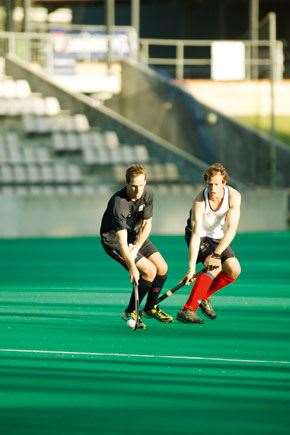 Penalty corners are more than a skill requirement.
Penalty corners are more than a skill requirement.Images: Theron Kirkman
SUIT YOURSELF
“The hockey session which we complete each Friday is an individual skills session. Everyone in the Kookaburras squad is required to do it, but that session is up to you in terms of how you want to structure it. For example, I might want to work on receiving the ball in a potential contested possession situation, or I might want to practise my delivery. So that will be my focus and the coaching staff will assist me in setting up some drills to help me with it. It might be just taking 20-30 balls aside and hitting towards a target. It could be that simple. Or it could involve coach feedback or even other players helping you out with certain aspects of your game.”
TOUGH STUFF
“The gameplay work in each session is what kills you physically. The skills-focused stuff isn’t too overtaxing, because the focus is on actually executing the skill. It’s not overly physical, it’s more technical. At each training session we’ll play some small games – could be anything from three on three, maybe six on six. And it’s constant: ball goes out, coach throws a new one on … that’s where you get your physical conditioning. In saying all that, it’s also what most of the guys look forward to, that competitive, gameplay situation.”
WELL-BALANCED
“In the gym a big focus for us is balance and stability. We do a lot of twisting rotation, range-of-motion stuff. It’s all designed to have a hockey-specific focus and to try and help us with execution of skill on-the-run and being balanced, to make the right passes and to have strength. Hockey is specific in the actual movements you do. You’re bent over the ball, not upright with the ball in your hand. We’re all about strengthening that core area and focussing on balance, stability and execution.
“A lot of it’s technique, making sure you’re getting the right muscles working. You’ve really got to focus on the muscle groups and on getting that right. Our gym coach is pretty keen on that and he’ll pick you up if you’re starting to do things incorrectly. Gym sessions usually last an hour and a half.”
REPS AND SETS
“On average we do three sets of most exercises. We have a different program each day. One day might have a slightly upper body focus and another maybe lower body. It’s really individual, after we do an initial screening at the start of any phase, which picks up any deficiencies we might have. The gym coach will find those out, then concentrate on maybe our range of motion, or it might be building strength in areas where we’re injury-prone.
“We’ll do between six and ten reps per exercise, of which there are 10-15. In the gym, if we’re focusing on that core area, squats are a pretty standard exercise, just for developing glut strength. There are lunges, lunges with a twist (a lunge and then twisting the upper body – as in stepping into a ball and hitting). We’ll do other twisting motions, too, even if it’s just abdominal work in a sit-up position. We’ll do back extensions, trying to strengthen the back as well; obviously in the bent-over position that you’re playing hockey in, you can develop lower back problems.”
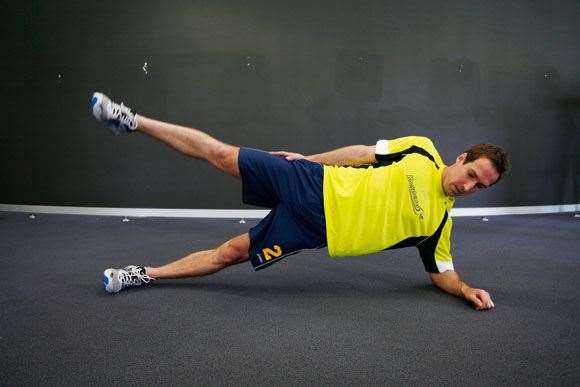 “we do a lot of twisting, range-of-motion exercises in the gym.” Images: Theron Kirkman
“we do a lot of twisting, range-of-motion exercises in the gym.” Images: Theron KirkmanTO THE VIDEO
“In the final weeks leading up to a major event, say, the qualifier against New Zealand, there’ll be a larger focus on video work. We’ll look at the opposition’s individual players, their strategies and work out what we’ll do to counteract them. A video session will last an hour or more.“During the year we might look at our own game. A video session would be feedback on things which happened on-field at training or in past games of ours and stuff we can work on.
“I find video sessions quite useful. I’ve played a bit against most of the international teams going around and know most of them by now. I always remember being a new player to the group and not having seen any of the international players and not knowing what tricks were in their bag. Studying your rivals via video and preparing for what they’re going to try to do can help a lot. Obviously there’s nothing like experiencing it first hand, but any advantage you can get is a good one.”
TACTICAL RESPONSE
“We’ll focus more on tactics in the week leading up to a tournament, too. In general, it’s more a case of the coach discussing one or two plays where there’s a bit of a theme, where something’s not quite right with our play. Ric will normally show a video of what’s happened and say, ‘This is what our focus will be on at training,’ so that at training we can relate what we’re doing to why we’re doing it.”
QUICK RECOVERY
“Recovery sessions are held after a field/skills session. We’ll have a high-intensity session, then we’ll have a recovery – ice baths … we know a bit about those. We’ll be in there for one or two minutes, then jump out so we’re alternating between hot and cold, hot and cold. The swapping aids blood flow and helps get rid of all the lactic acids etc. The more you can speed the blood flow, the faster the recovery. We know it helps us, but we still like to complain about it.”
SHOWING SKIN
“Diet’s up to the individual. We have a dietician to help us out. If we’re not eating right, we’ll soon notice in our performance and in our skinfold tests. We’re tested regularly, where the team staff get the callipers out. If you start to head north on that scale, they get you to speak to the dietician and work out a plan that’s best for you.
“We don’t really have an off-season, but even if there is time off, getting lazy in that area and doing the wrong thing puts you behind the eight ball when you start again and you don’t want to go there. Even in time off there’s still a focus on eating properly, probably even more so, actually, as you’re not doing any intense work to burn any fatty foods off.”
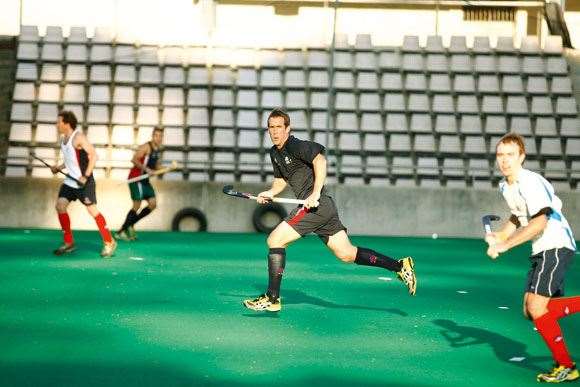 Liam De Young Midfielder/Defender. Images: Theron Kirkman
Liam De Young Midfielder/Defender. Images: Theron Kirkman’BURRA TUCKER
“For me it’ll just be cereal and yoghurt and maybe a bit of toast for breakfast. I’m not a huge brekky eater. Today I have some nice, fresh bread for lunch. I’m looking forward to that – a bit of carbs, just ham and salad sandwiches. I’m not one who needs to eat a pasta before I play or train or anything like that.
“During heavy training I eat a lot more. I’ll feel before the 6am session like I could use a banana or something – you know what’s ahead and you think, ‘Maybe I’ll just have a bit of this to give me that extra burst of energy. At 8am, when you knock off, you’re actually looking for a proper breakfast. By then you’ve eaten twice, but not huge meals … As long as it’s common sense you’re pretty right.”
RIC’S TRICKS
“Ric is a very, very good focuser on basics, which was surprising to me. I had him down as a weird and wonderful, creative coach, but he’s very focused on basic skill execution and being the best in that area. He demands a lot out of you and sets high standards, but he’s very fair as well. Not a big, bad guy, but very understanding and modern in his ways. This year he’s given about ten guys their international debuts, so he’s really branching out and giving everyone a go and bringing up a lot of young players and that’ll be a real advantage come the Champions Trophy in Melbourne this month and the World Cup in Delhi next year. We’ll have such a large group of players who would’ve had international exposure and the opportunity to impress and that’s always good. The bigger the talent pool you have to pick from, the more chance of success you have.”
– James Smith
Related Articles
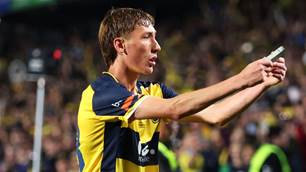
Socceroo-in-waiting seals Championship deal
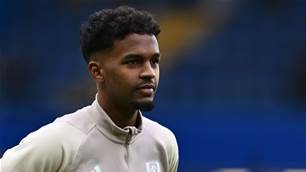
Fringe Socceroo swerves A-League to remain in Europe after Fulham exit
